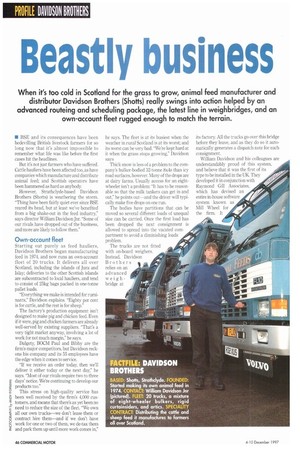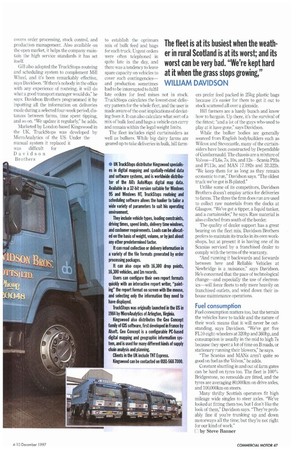eastly business
Page 48

Page 49

If you've noticed an error in this article please click here to report it so we can fix it.
When it's too cold in Scotland for the grass to grow, animal feed manufacturer and distributor Davidson Brothers (Shotts) really swings into action helped by an advanced routeing and scheduling package, the latest line in weighbridges, and an own-account fleet rugged enough to match the terrain.
• BSE and its consequences have been bedevilling British livestock farmers for so long now that it's almost impossible to remember what life was like before the first cases hit the headlines.
But it's not just farmers who have suffered. Cattle hauliers have been affected too, as have companies which manufacture and distribute animal feed; and Scottish operators have been hammered as hard as anybody.
However, Strathclyde-based Davidson Brothers (Shotts) is weathering the storm. "Thing have been fairly quiet ever since B,SE reared its head, but at least we've benefited from a big shake-out in the feed industry," says director William Davidson Jnr. "Some of our rivals have dropped out of the business, and more are likely to follow them."
Own-account fleet
Starting out purely as feed hauliers, Davidson Brothers began manufacturing feed in 1974, and now runs an own-account fleet of 20 trucks. It delivers all over Scotland, including the islands of Jura and Islay; deliveries to the other Scottish islands are subcontracted to local hauliers, and tend to consist of 25kg bags packed in one-tonne pallet loads.
"Everything we make is intended for ruminants," Davidson explains. "Eighty per cent is for cattle, and the rest is for sheep."
The factory's production equipment isn't designed to make pig and chicken feed. Even if it were, pig and chicken farmers are already well-served by existing suppliers. "That's a very tight market anyway, involving a lot of work for not much margin," he says.
Dalgety, BOCM Paul and Bibby are the firm's major competitors, but Davidson reckons his company and its 55 employees have the edge when it comes to service.
"If we receive an order today, then we'll deliver it either today or the next day," he says. "Most of our rivals require two to three days' notice. We're continuing to develop our products too."
This stress on high-quality service has been well received by the firm's 4,000 customers, and means that there's as yet been no need to reduce the size of the fleet. "We own all our own trucks—we don't lease them or contract hire them—and if we don't have work for one or two of them, we de-tax them and park them up until more work comes in," he says. The fleet is at its busiest when the weather in rural Scotland is at its worst; and its worst can be very bad. "We're kept hard at it when the grass stops growing," Davidson says Thick snow is less of a problem to the company's bulker-bodied 32-tonne 8x4s than icy road surfaces, however. Many of the drops are at dairy farms. Usually access for an eightwheeler isn't a problem: "It has to be reasonable so that the milk tankers can get in and out." he points out—and the driver will typically make five drops on one run.
The bodies have partitions that can be moved so several different loads of unequal size can be carried. Once the first load has been dropped the next consignment is allowed to spread into the vacated compartment to avoid a diminishing loads problem.
The trucks are not fitted with on-board weighers. Instead, Davidson Brothers relies on an advanced weigh. bridge at its factory. All the trucks go over this bridge before they leave, and as they do so it automatically generates a dispatch note for each consignment.
William Davidson and his colleagues are understandably proud of this system, and believe that it was the first of its type to be installed in the UK. They developed it in conjunction with Raymond Gill Associates, which has devised an entire in-house software system known as Mill Wheel for the firm. It covers order processing, stock control, and production management. Also available on the open market, it helps the company maintain the high service standards it has set Gill also adopted the TruckStops routeing and scheduling system to complement Mill Wheel, and its been remarkably effective, says Davidson. "If there's nobody in the office with any experience of routeing, it will do what a good transport manager would do," he says. Davidson Brothers programmed it by inputting all the information on deliveries made during a selected four-week period; distances between farms, time spent tipping, and so on. "We update it regularly," he adds.
Marketed by London-based Kingswood in the UK, TruckStops was developed by MicroAnalytics of the US. Under the manual system it replaced it was difficult for Davidson Brothers to establish the optimum mix of bulk feed and bags for each truck. Urgent orders were often telephoned in quite late in the day, and there was a tendency to leave spare capacity on vehicles to cover such contingencies— and production sometimes had to be interrupted to fulfil late orders for feed mixes not in stock. TruckStops calculates the lowest-cost delivery pattern for the whole fleet, and the user is made aware of the cost implications of deviating from it. It can also calculate what sort of a mix of bulk feed and bags a vehicle can carry and remain within the legal weight limits.
The fleet includes rigid curtainsiders as well as bulkers. While big dairy farms are geared up to take deliveries in bulk, hill farm ers prefer feed packed in 25kg plastic bags because it's easier for them to get it out to stock scattered all over a glenside.
Hill farmers are a hardy bunch and know how to bargain. Up there, it's the survival of the fittest; "and a lot of the guys who used to play at it have gone." says Davidson.
While the bulker bodies are generally sourced from English bodybuilders such as Wilcox and Stevecastle, many of the curtainsiders have been constructed by Dependable of Cumbernauld. The chassis are a mixture of Volvos-1'16s, 75, 10s, and 12s— Scania P93s and P113s, and MAN 17.192s and 32.322s. "We keep them for as long as they remain economic to run," Davidson says. "The oldest truck we've got is B-plated."
Unlike some of its competitors, Davidson Brothers doesn't employ artics for deliveries to farms. The three the firm does run are used to collect raw materials from the docks at Glasgow. "We've got a tipper, a liquid tanker, and a curtainsider," he says. Raw material is also collected from south of the border.
The quality of dealer support has a great bearing on the fleet mix. Davidson Brothers prefers to maintain its trucks in its own workshops, but at present it is having one of its Scanias serviced by a franchised dealer to comply with the terms of the warranty.
"And running it backwards and forwards between here and Reliable Vehicles at Newbridge is a nuisance," says Davidson. He's concerned that the pace of technological change—and especially the use of electronics—will force fleets to rely more heavily on franchised outlets, and wind down their inhouse maintenance operations.
Fuel consumption
Fuel consumption matters too, but the terrain the vehicles have to tackle and the nature of their work means that itwill never be outstanding, says Davidson. "We've got five FL10 eight-wheelers at 320hp and 360hp, and consumption is usually in the mid to high 7s because they spent a lot of time on B roads, or stationary running their blowers," he says.
"The Scanias and MANs aren't quite so good on fuel as the Volvos," he adds.
Constant shuttling in and out of farm gates can be hard on tyres too. The fleet is 100% Bridgestone, no remoulds are fitted, and the tyres are averaging 80,000km on drive axles, and 100.000km on steers.
Many thrifty Scottish operators fit high mileage wide singles to steer axles. "We've looked at fitting them too, burl don't like the look of them," Davidson says. "They're probably fine if you're trunking up and down motorways all the time; but they're not right for our kind of work,"
fl by Steve Banner
FACT1 DAVIDSON
BROTHERS
BASED: Shafts, Strathclyde. FOUNDED: Started making its own animal feed in 1974. CONTACT: William Davidson inr (pictured). FLEET: 20 trucks, a mixture of eight-wheeler bulkers, rigid curtainsiders, and clinics. SPECIALITY CONTRACT: Distributing the cattle and sheep feed it manufactures to farmers all over Scotland. * UK TruckStops distributor Kingswood specialises in digital mapping and spatially-related data and software systems, and is worldwide distributor of the M's AutoMaps digital map data. Available in a 32-bit version suitable for Windows 95 and Windows NT, TruckStops routeing and scheduling software allows the haulier to tailor a wide variety of parameters to suit his operating environment.
They include vehicle types, loading constraints, driving times, speed limits, delivery time windows, and customer requirements. Loads can be allocated on the basis of weight, volume, or by just about any other predetermined factor.
It can read collection or delivery information in a variety of the file formats generated by order processing packages.
It can also cope with 16,300 drop points, 16,300 vehicles, and lm records.
Users can configure their own report formats quickly with an interactive report writer, "painting" the report format on screen with the mouse, and selecting only the information they need to have displayed.
TruckStops was originally launched in the US in 1984 by MicroAnalytics of Arlington, Virginia. Kingswood also distributes the Geo Concept family of CIS software, first developed in France by Alsoft. Geo Concept is a configurable PC-based digital mapping and geographic information system, and is used for many different kinds of supply chain analysis and planning.
Clients in the UK include TNT Express.
Kingswood can be contacted on 0181-568 7000.
















































































































